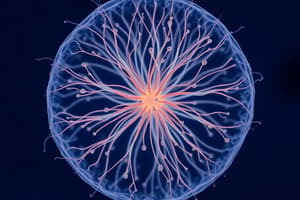Podcast
Questions and Answers
What is the primary product of aerobic respiration?
What is the primary product of aerobic respiration?
Aerobic respiration does not require oxygen.
Aerobic respiration does not require oxygen.
False (B)
What is the effect of temperature on the respiration rate of yeast?
What is the effect of temperature on the respiration rate of yeast?
Increase in temperature generally increases the respiration rate, up to a certain point.
During anaerobic respiration in muscles, glucose is converted into ______.
During anaerobic respiration in muscles, glucose is converted into ______.
Signup and view all the answers
Match the type of respiration with its description:
Match the type of respiration with its description:
Signup and view all the answers
What is the role of enzymes in respiration?
What is the role of enzymes in respiration?
Signup and view all the answers
What happens to methylene blue dye during the investigation of respiration in yeast?
What happens to methylene blue dye during the investigation of respiration in yeast?
Signup and view all the answers
Anaerobic respiration produces more energy per glucose molecule than aerobic respiration.
Anaerobic respiration produces more energy per glucose molecule than aerobic respiration.
Signup and view all the answers
What is the main purpose of respiration in living cells?
What is the main purpose of respiration in living cells?
Signup and view all the answers
Anaerobic respiration in yeast produces lactic acid.
Anaerobic respiration in yeast produces lactic acid.
Signup and view all the answers
What indicator is used to investigate the effect of temperature on yeast respiration?
What indicator is used to investigate the effect of temperature on yeast respiration?
Signup and view all the answers
During aerobic respiration, glucose combines with ______ to release energy.
During aerobic respiration, glucose combines with ______ to release energy.
Signup and view all the answers
Match the type of respiration with its main output:
Match the type of respiration with its main output:
Signup and view all the answers
What happens to methylene blue dye during the respiration experiment with yeast?
What happens to methylene blue dye during the respiration experiment with yeast?
Signup and view all the answers
The condition of needing extra oxygen after exercise is called ______.
The condition of needing extra oxygen after exercise is called ______.
Signup and view all the answers
Flashcards
Respiration
Respiration
Chemical reactions that break down nutrient molecules in cells to release energy.
Aerobic Respiration
Aerobic Respiration
Releases energy from nutrients using oxygen.
Anaerobic Respiration
Anaerobic Respiration
Releases energy without using oxygen.
Lactic Acid
Lactic Acid
Signup and view all the flashcards
Oxygen Debt
Oxygen Debt
Signup and view all the flashcards
Glucose
Glucose
Signup and view all the flashcards
Respiration rate
Respiration rate
Signup and view all the flashcards
Effect of Temperature on Respiration
Effect of Temperature on Respiration
Signup and view all the flashcards
What is respiration?
What is respiration?
Signup and view all the flashcards
What are the uses of energy in the body?
What are the uses of energy in the body?
Signup and view all the flashcards
How does temperature affect respiration?
How does temperature affect respiration?
Signup and view all the flashcards
What is aerobic respiration?
What is aerobic respiration?
Signup and view all the flashcards
What are the products of aerobic respiration?
What are the products of aerobic respiration?
Signup and view all the flashcards
What is anaerobic respiration?
What is anaerobic respiration?
Signup and view all the flashcards
What are the products of anaerobic respiration in muscles?
What are the products of anaerobic respiration in muscles?
Signup and view all the flashcards
What is oxygen debt?
What is oxygen debt?
Signup and view all the flashcards
Study Notes
Respiration
- Respiration is the chemical breakdown of nutrient molecules in cells to release energy.
- Energy is used for various bodily functions: muscle contraction, protein synthesis, cell division, active transport, growth, nerve impulses, and temperature regulation.
- Enzymes speed up these reactions.
Effect of Temperature on Yeast Respiration
- Methylene blue is used as an indicator to measure respiration rate in yeast.
- The faster the dye loses color, the faster the respiration rate.
- Independent Variable (IV): Temperature
- Dependent Variable (DV): The time it takes for methylene blue to decolorize (measuring respiration rate).
- Aerobic respiration used to measure the rate (using oxygen).
Aerobic Respiration
- Aerobic respiration uses oxygen to break down nutrients for energy.
- Chemical equation: Glucose + Oxygen → Carbon Dioxide + Water
- Chemical formula: C6H12O6 + 6O2 → 6CO2 + 6H2O
Anaerobic Respiration
- Anaerobic respiration does NOT use oxygen to break down nutrients for energy.
- Different products depending on the organism
- In muscles (during vigorous exercise): Glucose → Lactic Acid
- In yeast (single-cell fungi): Glucose → Ethanol + Carbon Dioxide
- Chemical equation for yeast: C6H12O6 → 2C2H5OH + 2CO2.
Disadvantages of Anaerobic Respiration
- Anaerobic respiration produces far less energy (about 1/20th) than aerobic respiration per glucose molecule.
- Anaerobic respiration produces lactic acid, which is toxic.
Lactic Acid
- Buildup in muscles and blood during strenuous exercise.
- The body needs extra oxygen to process the lactic acid afterward.
Oxygen Debt
- Post-exercise need to breathe heavily to supply the extra oxygen required.
- Body removes oxygen debt through:
- Sustained increased heart rate to carry lactic acid to the liver.
- Sustained increased breathing to provide oxygen for aerobic processes.
- Liver's aerobic processing of lactic acid.
Comparison of Aerobic and Anaerobic Respiration
| Feature | Aerobic Respiration | Anaerobic Respiration |
|---|---|---|
| Oxygen needed | Yes | No |
| Glucose breakdown | Complete combustion | Incomplete combustion |
| Products | Carbon Dioxide and Water | Animals: Lactic Acid, Yeast: Carbon Dioxide and Ethanol |
| Energy released | More | Less |
Studying That Suits You
Use AI to generate personalized quizzes and flashcards to suit your learning preferences.
Description
This quiz explores the process of respiration, focusing on yeast and the effect of temperature on its respiration rate. Understanding aerobic respiration and the use of methylene blue as an indicator are key components. Test your knowledge of these biological processes and their importance in energy release.




